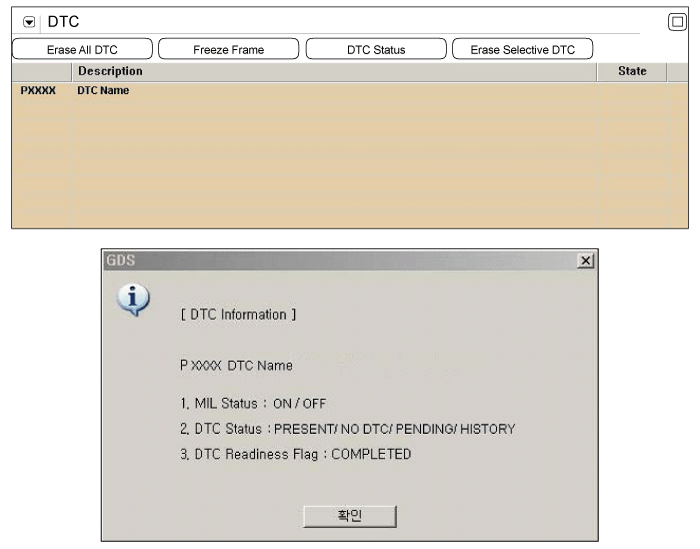The Wheel Speed Sensor
(WSS) generates a waveform with a frequency proportional to the speed of
the vehicle. The signal generated by the WSS informs the PCM not only if
the vehicle speed is low or high but also if the vehicle is or is not
moving. The PCM uses this signal to control the fuel injection, ignition
timing, transaxle shift scheduling and torque converter clutch scheduling.
The WSS signal is also used to detect rough road conditions.
Checking vehicle speed
signal every from ABS(or ESC) control every 30 sec. under detecting
condition, if an signal is in the detecting condition for more than 20
sec., PCM sets P0501. MIL(Malfunction Indication Lamp) turns on when the
malfunction lasts till consecutive 2 driving cycle.
Item
|
Detecting
Condition
|
Possible cause
|
DTC Strategy
|
| •
|
Detects the lack of vehicle speed
signal | |
| •
|
Open or short in
harness |
| •
|
ABS or ESC control
unit |
|
Enable
Conditions
|
Case
1(Power)
|
| •
|
No VSS disabling malfunction
present |
| •
|
11V< Ignition Voltage<
16V |
| •
|
Engine Coolant Temperature >60°C
(140°F) |
| •
|
1200rpm ≤ Engine Speed ≤
4000rpm |
| •
|
Vehicle Speed derived from transmission
≥ 10 kph(6.2 mph) | |
Case
2(Decel)
|
| •
|
No VSS disabling malfunction
present |
| •
|
11V< Ignition Voltage<
16V |
| •
|
Engine Coolant Temperature >60°C
(140°F) |
| •
|
1800rpm ≤ Engine Speed ≤
6000rpm |
|
Thresh
old
value
|
Case
1(Power)
|
|
Case
2(Decel)
|
| •
|
Delta Engine Speed ≥
100rpm | |
Diagnosis Time
|
| •
|
Continuous
(More than 20 seconds failure for every
30 seconds test ) | |
MIL On Condition
|
|

| 1. |
Check DTC Status
| (1) |
Connect scantool to Data Link
Connector(DLC). |
| (3) |
Select "DTC" button, and then Press "DTC
Status" to check DTC's information from the DTCs
menu. |
| (4) |
Read "DTC Status"
parameter.

|
| (5) |
Is parameter displayed "Present
fault"?
|

|
▶ Go
to "Terminal and connector inspection"
procedure.
|
|

|
▶
Fault is intermittent caused by poor contact in the
sensor's and/or PCM's connector or was repaired and PCM
memory was not cleared. Thoroughly check connectors for
looseness, poor connection, ending, corrosion,
contamination, deterioration, or damage. Repair or
replace as necessary and go to "Verification of Vehicle
Repair"
procedure.
|
| |
| Terminal And Connector
Inspection |
| 1. |
Many malfunctions in the electrical system are
caused by poor harness and terminal condition. Faults can also be
caused by interference from other electrical systems, and mechanical
or chemical damage. |
| 2. |
Thoroughly check connectors for looseness,
poor connection, bending, corrosion, contamination, deterioration,
or damage. |
| 3. |
Has a problem been found?
|

|
▶ Repair as
necessary and go to "Verification of Vehicle Repair"
procedure
|
|

|
▶ Go to "
Signal Circuit Inspection "
procedure.
|
|
| Signal Circuit
Inspection |
■ Check short to ground in harness
| 2. |
Disconnect PCM connector and ABS(ESC) control
module connector. |
| 3. |
Measure resistance between vehicle speed input
signal terminal of PCM harness connector and chassis
ground.
|
| 4. |
Is the measured resistance within
specifications?
|

|
▶ Go to
"Check open in harness" as follows.
|
|

|
▶ Repair
short to ground in harness, and go to "Verification of Vehicle
Repair"
procedure.
|
|
■ Check for open in harness
| 2. |
Disconnect PCM connector and ABS(ESC) control
module connector. |
| 3. |
Measure resistance between vehicle speed input
signal terminal of PCM harness connector and wheel speed sensor
output signal terminal of ABS(ESC) control module harness
connector.
Specification
: Approx. below 1Ω
| |
| 4. |
Is the measured resistance within
specifications?
|

|
▶ Go to "
Check wheel speed sensor " procedure.
|
|

|
▶ Check
open in harenss.
▶ Repair or
replace as necessary and then, go to " Verification of Vehicle
Repair"
procedure.
|
|
■ Check wheel speed sensor
| 2. |
Check open or short in wheel speed sensor
(Refer to "C1203 Wheel speed sensor front-RH
open/short") |
| 3. |
Is the wheel speed sensor normal?
|

|
▶
Substitute with a known - good PCM/ ABS(ESC) control unit and
check for proper operation. If the problem is corrected,
replace PCM/ ABS(ESC) control unit and go to "Verification of
Vehicle Repair" procedure.
|
|

|
▶ Repair or
replace it as necessary.
▶ And then
go to " Verification of Vehicle Repair"
procedure.
|
|
There is a memory reset function on
scantool that can erase optional parts automatically detected
and memorized by PCM. After testing PCM on the vehicle, use
this function to reuse the PCM on the
others. | |
| Verification Of Vehicle
Repair |
After a repair, it is
essential to verify that the fault has been corrected.
| 1. |
Connect scantool and select "DTC"
button. |
| 2. |
Press "DTC Status" button and confirm that
"DTC Readiness Flag" indicates "Completed". If not, drive the
vehicle within conditions noted in the freeze frame data or enable
conditions |
| 3. |
Read "DTC Status"
parameter |
| 4. |
Is parameter displayed "History(Not Present)
fault"?
|

|
▶ System
performing to specification at this time. Clear the
DTC
|
|

|
▶ Go to the
applicable troubleshooting
procedure.
|
|